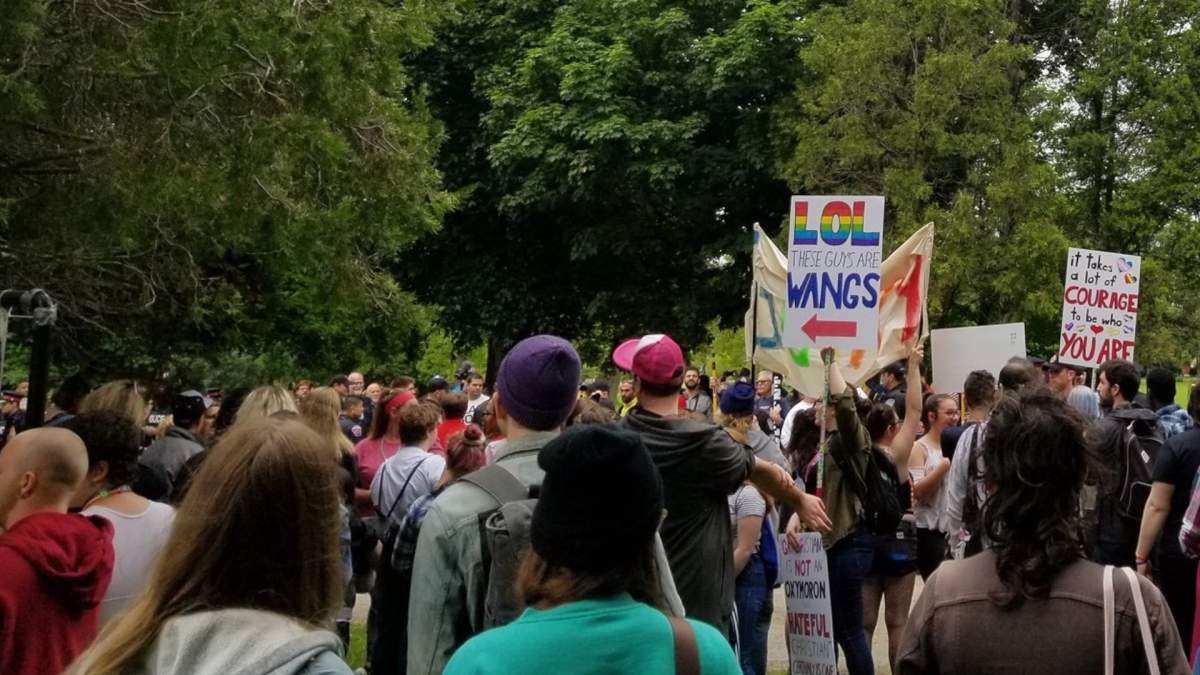EDITOR’S NOTE: This story previously contained a line about a recruitment pitch during Thursday’s board meeting specific to the LGBTQ2 community, but was a misinterpretation of a quote from a talk interview. It has since been updated with the correct information.

Hamilton police have released the survey results of the city’s LGBTQ2 community as the service works toward implementing the recommendations from an independent review of Pride 2019.
The findings from the survey conducted by McMaster University researchers have been compiled in a report that will be presented to Hamilton’s police services board next week.
Respondents were asked questions about who would be suitable for the role of a third-party facilitator between police and the LGBTQ2 community, as well as the creation of a community advisory panel, and issues that should be addressed in future conversations.
The survey found that the facilitator should be someone who is politically neutral, unbiased, independent of the Hamilton police and a member of the LGBTQ2 community. The person should understand historical oppression of marginalized groups by police, have previous experience working with the LGBTQ2 community or other marginalized groups and a background in trauma-informed practices.
Chief Frank Bergen said the responses they received will guide how the service makes its next steps.
“We’re very, very encouraged that by the beginning of April, we’ll have the ability to now do public outreach to make sure then that we can move this conversation forward, a conversation that needs to occur,” he said during an interview on Global News Radio 900 CHML’s Bill Kelly Show.
He added that discussions are already underway to prepare for June’s Pride festival if Pride Hamilton opts to hold an in-person event this year — something that hasn’t happened since 2019 because of the pandemic.

Get breaking National news
The survey is a component of just one of 38 recommendations from an independent review, which condemned how Hamilton police responded to violence at Pride 2019.
So far, the service says it has completed 22 of those recommendations, with the other 16 classified as ‘in progress’.
Some of the most common themes in the survey, which ran from August to the end of September 2021, included police accountability and public acknowledgment of the harm police have caused against marginalized communities.
“Naming and working to end racism, heterosexism, cis-sexism, sexism within the ranks of HPS,” reads one quote within the report. “These dangerous attitudes should not be normalized and shrugged off.”
Another person wrote that Hamilton police need to “pay up” for the damages they’ve caused and “formally remove themselves” from “all things” related to the city’s LGBTQ2 community.
“Years of dismantling the systemic abuse of power and the need to release all past records in order to start to build a new path forward, we cannot skip to reconciliation without publicly owning in great detail past wrongs,” that individual wrote.
The report also said some respondents highlighted a need for more LGBTQ2 representation within the Hamilton police service.
Bergen said the service is working to address that need and continues to actively seek new recruits.
“The reality is, if we are not a trusted partner within the community, it becomes difficult. So I can be very comfortable in telling you that this is a goal of the Hamilton Police Service. It’s to work with all our communities to make sure that we can represent … the rich diversity of our community.”
Multiple respondents also mentioned defunding police and reallocating financial resources to other services rather than hiring more police.
“Healing looks like ‘defunding police services by placing surplus into housing and a queer and trans community centre’,” wrote one person.
“Generally, leave us alone if you’re not showing up to protect us…Don’t be surprised if twospirit, queer, and trans folks do not wish to ever engage with HPS.”
The survey heard from 350 people overall, but only 44 per cent of responses were actually useable.
The report’s authors wrote that they rejected “surveys that were blank, that included nonsensical responses that did not meaningfully engage with the survey questions, and those that contained homophobic comments or otherwise made clear that they were not completed” by members of the LGBTQ2 community.








Comments